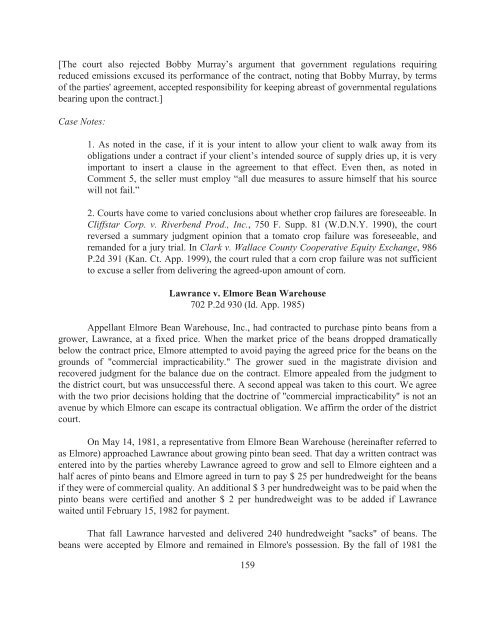Sales and Leases - A Problem-based Approach, 2016a
Sales and Leases - A Problem-based Approach, 2016a
Sales and Leases - A Problem-based Approach, 2016a
You also want an ePaper? Increase the reach of your titles
YUMPU automatically turns print PDFs into web optimized ePapers that Google loves.
[The court also rejected Bobby Murray’s argument that government regulations requiring<br />
reduced emissions excused its performance of the contract, noting that Bobby Murray, by terms<br />
of the parties' agreement, accepted responsibility for keeping abreast of governmental regulations<br />
bearing upon the contract.]<br />
Case Notes:<br />
1. As noted in the case, if it is your intent to allow your client to walk away from its<br />
obligations under a contract if your client’s intended source of supply dries up, it is very<br />
important to insert a clause in the agreement to that effect. Even then, as noted in<br />
Comment 5, the seller must employ “all due measures to assure himself that his source<br />
will not fail.”<br />
2. Courts have come to varied conclusions about whether crop failures are foreseeable. In<br />
Cliffstar Corp. v. Riverbend Prod., Inc., 750 F. Supp. 81 (W.D.N.Y. 1990), the court<br />
reversed a summary judgment opinion that a tomato crop failure was foreseeable, <strong>and</strong><br />
rem<strong>and</strong>ed for a jury trial. In Clark v. Wallace County Cooperative Equity Exchange, 986<br />
P.2d 391 (Kan. Ct. App. 1999), the court ruled that a corn crop failure was not sufficient<br />
to excuse a seller from delivering the agreed-upon amount of corn.<br />
Lawrance v. Elmore Bean Warehouse<br />
702 P.2d 930 (Id. App. 1985)<br />
Appellant Elmore Bean Warehouse, Inc., had contracted to purchase pinto beans from a<br />
grower, Lawrance, at a fixed price. When the market price of the beans dropped dramatically<br />
below the contract price, Elmore attempted to avoid paying the agreed price for the beans on the<br />
grounds of "commercial impracticability." The grower sued in the magistrate division <strong>and</strong><br />
recovered judgment for the balance due on the contract. Elmore appealed from the judgment to<br />
the district court, but was unsuccessful there. A second appeal was taken to this court. We agree<br />
with the two prior decisions holding that the doctrine of "commercial impracticability" is not an<br />
avenue by which Elmore can escape its contractual obligation. We affirm the order of the district<br />
court.<br />
On May 14, 1981, a representative from Elmore Bean Warehouse (hereinafter referred to<br />
as Elmore) approached Lawrance about growing pinto bean seed. That day a written contract was<br />
entered into by the parties whereby Lawrance agreed to grow <strong>and</strong> sell to Elmore eighteen <strong>and</strong> a<br />
half acres of pinto beans <strong>and</strong> Elmore agreed in turn to pay $ 25 per hundredweight for the beans<br />
if they were of commercial quality. An additional $ 3 per hundredweight was to be paid when the<br />
pinto beans were certified <strong>and</strong> another $ 2 per hundredweight was to be added if Lawrance<br />
waited until February 15, 1982 for payment.<br />
That fall Lawrance harvested <strong>and</strong> delivered 240 hundredweight "sacks" of beans. The<br />
beans were accepted by Elmore <strong>and</strong> remained in Elmore's possession. By the fall of 1981 the<br />
159


















